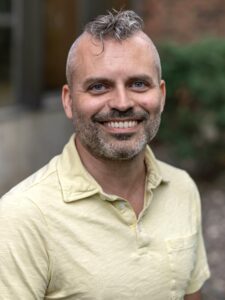 By Johan Baumeister
By Johan Baumeister
The first time I walked into Salem English Lutheran Church was a cold and dreary day in early 2006. I’d visited the Lutherans Concerned (now ReconcilingWorks) website and found the congregation listed as a Reconciling In Christ (RIC) congregation. While I was hopeful that it would be a place where I would feel welcome, my past experience had taught me that not every faith community would meet that need.
There’s a certain vocabulary to exclusion – one which is part learned and part inherited. At its most obvious, it can take the form of condemnation and slurs and stereotypes and policies that prevent not only full inclusion but any meaningful participation in church or society. Over my life I’ve seen this applied to a long list of people that society or the church refused to see as deserving of full dignity and inclusion – a list that included women, people of color, people living with disabilities, and my own LGBTQ+ community.
Exclusion can also have a more subtle vocabulary: One that reserves words like “normal” for certain people and lives. One that expresses resentment about the effort required to unlearn language that demeans others. One that shares a wish that certain folks weren’t “so sensitive”. One that diminishes the concerns of those most impacted by exclusion.
“There’s a certain vocabulary to exclusion.”
Society argues endlessly about that vocabulary these days: What is acceptable and what’s not? Why is “callout culture” or “cancel culture” a problem or why isn’t it? Who is to blame and what level of retribution does their perceived faults merit. And all the while, the souls who are bearing the weight of that extensive vocabulary of exclusion continue to be crushed.
Expending anger at or sitting in judgment of those who create communities of exclusion won’t build what we need. It’s tempting though. Oh, is it ever tempting.
In our 24/7 world, the outrage-driven engagement algorithms center and highlight all the awfulness we can bear – and then some – and only occasionally leaven our feeds or news programs with hope. It is a radical act to resist losing the best parts of ourselves to the outrage, … almost as radical as resisting the exclusion itself.
Resisting outrage for strategic reasons is a difficult one, too. I know I’m not always successful.
SALEM LUTHERAN AND THE ELCA have taught me that we can do better. That first day that I walked into Salem, I met Barb and Roger. They and others there made a practice of deep and radical welcome. I felt respected just as I was, and like I belonged. It only took a handful of conversations, where folks who were loving and caring Lutherans actively listened and expressed support, for Salem to feel like a place of welcome for LGBTQ+ folks.
Instead of responding to exclusion solely with outrage, we can respond with a robust vocabulary of inclusion – a vocabulary built not as a rejection of exclusion but rather as an embrace of the excluded.
A vitally important part of the vocabulary of inclusion is reconciliation. There is no one right path to reconciliation, but there are many ways to avoid doing the work. As someone whose congregation is a RIC congregation, I’m glad to know that more than 10% of the congregations in the ELCA have now become RIC, committed to actively welcoming LGBTQ+ folks and rejecting exclusion. Modeling the importance of inclusion, ReconcilingWorks, the organization that facilitates this process, have themselves committed to building their intersectional work around racial equity and inclusion.
“Instead of responding to exclusion solely with outrage, we can respond with a robust vocabulary of inclusion.”
Being a part of a congregation that has made a public commitment of welcome and reconciliation is deeply meaningful to me, a person who was rejected by the denomination that baptized him. Moreover, that commitment by my congregation has helped me to know it is a safe place in a world that hasn’t always been so and still often isn’t, especially for my transgender siblings in Christ.
I believe that one of the most powerful words in the vocabulary of inclusion is ally. And it isn’t really one we get to bestow upon ourselves. Instead, just as faith without works is a barren tree, claiming allyship without demonstrated efforts is as well. Those we seek to make welcome will see us as allies not by our claim of that label, but by making their well-being our priority and by advocating for their priorities. Leaders in this church did take public stances for and with my own LGBTQ+ community in 2012 and 2013 when they stood in public witness for the dignity and love of same sex couples who weren’t allowed to be married.
I know we can build our vocabulary further, because my church did it for me and others like me. I have faith in us and in our ability to learn from Jesus, who rejected no one and loved all. So, as you celebrate LGBTQ+ Pride, I invite you to recommit to the work. Find ways to keep building your vocabulary of inclusion, because that inclusion is a reflection of Christ’s love.
